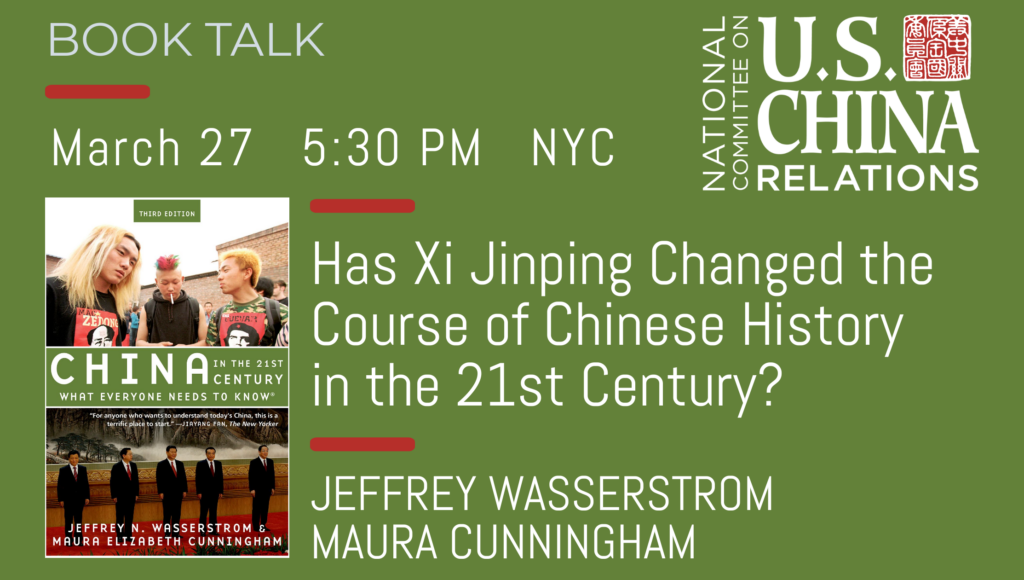Tuesday, March 27, 2018 | 5:30 PM EDT - 7:00 PM EDT
National Committee on U.S.-China Relations |, New York, NY 10017
The recent proposal to remove presidential term limits in China has prompted questions about the country’s future development, and the historical legacy of China’s past authoritarian leaders seems relevant once again. How should we understand the current direction of China’s political culture? In a newly revised and updated book, modern China historians Jeffrey Wasserstrom and Maura Cunningham review the key historical trends that have shaped China’s development in the 21st century. From Confucian thought to U.S.-China relations under Trump and Xi, China in the 21st Century: What Everyone Needs to Know, third edition, provides essential knowledge for understanding the world’s emerging superpower. Dr. Cunningham and Dr. Wasserstrom discussed their book and how to understand contemporary China in historical perspective with the National Committee on March 27, 2018.

Maura Elizabeth Cunningham
Maura Elizabeth Cunningham is a writer and historian of modern China. She is a graduate of Saint Joseph’s University (B.A.), Yale University (M.A.), the Hopkins-Nanjing Center for Chinese and American Studies (graduate certificate), and the University of California, Irvine (Ph.D.), as well as of Chinese language programs in Beijing and Hangzhou. Dr. Cunningham’s dissertation was a social and cultural history of child welfare in 20th-century Shanghai; she is currently working on a book about children’s cartoonist Zhang Leping.
Dr. Cunningham was the editor-in-chief of The China Beat, a blog based at UC Irvine, between 2009 and 2012, and associate editor of ChinaFile during a fellowship at the Asia Society’s Center on U.S.-China Relations in 2011-12. From 2014 to 2016, Maura served as a program officer at the National Committee on U.S.-China Relations, where she co-directed the Public Intellectuals Program. In 2016, she moved to Ann Arbor, Michigan, to become the digital media manager at the Association for Asian Studies. Her work has appeared in the Wall Street Journal, the Financial Times, and the Los Angeles Review of Books, among other publications.

Jeffrey Wasserstrom
Jeffrey Wasserstrom is Chancellor’s Professor of History at UC Irvine, where he edits the Journal of Asian Studies; he also holds courtesy affiliations in the Law School and the Literary Journalism Program. Dr. Wasserstrom holds a bachelor’s degree from UC Santa Cruz, a master’s from Harvard, and a doctorate from Berkeley, and has written five books and edited or coedited several others. His most recent books as author and editor include, Eight Juxtapositions: China through Imperfect Analogies from Mark Twain to Manchukuo and the Oxford Illustrated History of Modern China.
In addition to writing for academic journals, Dr. Wasserstrom has contributed to many general interest publications, among them The New York Times, the TLS, and the Los Angeles Review of Books (LARB). He was a co-founder of The China Beat blog (2008-2012) and is now an academic editor for the LARB’s China Channel. He has served as a consultant for two prize-winning films by the Long Bow Film Group, was interviewed on camera for the documentary “Joshua: Teenager vs. Superpower,” is an adviser to the Hong Kong International Literary Festival, and is a former member of the board of directors of the National Committee on U.S.-China Relations.
